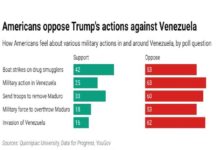By Paul Robinson
15 Apr, 2021
Just a month ago, US President Joe Biden indicated he believes his Russian counterpart, Vladimir Putin is a “killer.” But on Tuesday, he spoke to the ‘killer’ by phone and proposed that the pair meet for a face-to-face summit.
A few weeks is clearly a long time in politics.
So too, it seems, is a couple of days.
For on Thursday, Kremlin spokesman Dmitry Peskov declared that a summit between Biden and Putin would not go ahead in the near future. That does not mean that Moscow has definitively rejected a meeting at some point later, but it is clear that the Kremlin is not inclined to indulge Biden for now.
Peskov’s statement followed news that the United States was about to unveil a new set of economic sanctions against Russia, including measures to prevent American financial institutions from buying Moscow’s sovereign debt. The US also expelled ten Russian diplomats.
Consistency is generally a good thing. Sadly, US policy toward Russia appears to be decidedly inconsistent, offering an olive branch one day and then hitting with a big stick the next. From a Russian point of view, it must look two-faced, and consequently perhaps even worse than if it was straightforwardly hostile. What explains the mixed signals coming from Washington?
The basic starting point is that the US government views Russia as an aggressive challenger to the US-dominated world order. In addition, the Democratic party, which now holds both the presidency and Congress, is convinced that Russia, and Vladimir Putin specifically, was responsible for the election of Donald Trump in 2016. Domestic American politics do not allow for anything other than a hostile policy towards Russia. This is the new default position.
Thus the US intelligence community’s latest Annual Threat Assessment devotes an entire chapter to “Russian provocative actions”. This declares that, “Moscow will employ an array of tools – especially influence campaigns, intelligence and counterterrorism cooperation, military aid and combined exercises, mercenary operations, and arms sales – to advance its interests or undermine the interests of the United States and its allies.”
It follows from this that the US must hit back against Russia in order to punish it for its aggression, and to deter it from further actions.
In this context, Biden’s phone call and offer to normalize relations is rather out of place. One possible explanation for it is Ukraine. The war in Donbass between the Ukrainian government and the rebel Donetsk and Lugansk People’s Republics has gotten substantially hotter since the start of the year, with both sides breaking the ceasefire on a regular basis. Ukraine is alleged to have moved additional heavy equipment close to the front lines. Meanwhile, Moscow has been holding military exercises close to the Ukrainian border, possibly to deter Ukraine from launching an all-out assault on the rebels.
As a result, Western media and politicians have suggested that Russia might launch a surprise attack on Ukraine, while commentators on the Russian side have instead pointed the finger of blame at the USA, accusing it of egging the Ukrainians on. Tuesday’s phone call might suggest that Biden has blinked. Having allegedly pushed the Ukrainians to take a hard line against Russia, the United States has faced the reality of a tough Russian response, and decided to back off and calm things down.
As a result, Western media and politicians have suggested that Moscow might be preparing its own surprise attack on Ukraine, while commentators on the Russian side have instead pointed the finger of blame at the US, accusing it of egging the Ukrainians on. Tuesday’s phone call might suggest that Biden has blinked. He may view Russia as a threat, but he doesn’t want war. Having allegedly pushed the Ukrainians to take a hard line against Moscow, the United States has faced the reality of a tough Russian response, and decided to back off and calm things down.
In other words, Biden views Russia as an enemy, and is determined to push a hard line against it. But he doesn’t want war. Nor is there any evidence that he ever wanted to push Ukraine into a war with Russia – this is more of a fantasy of Russian TV talk show pundits than any sort of reality. The phone call and summit offer may be seen as a form of crisis management, walking the world back from the brink, but not as an indication of any significant change in overall policy.
The Kremlin’s unwillingness to immediately accept the summit offer is understandable. Moscow will no doubt be pleased that Biden appears to be trying to de-escalate the situation, but it is probably also deeply sceptical about the prospects of a summit meeting producing concrete results. If Biden can convince the Kremlin that he is serious about reaching agreement on specific issues, then its attitude will no doubt change. But for now there is little to be gained by the prospect of being lectured at and faced with threats and demands.
In any case, although the Russian government would no doubt favour a real dialogue, it’s not desperate for it. The United States appears not to fully appreciate how the world has changed in recent years, and the extent to which its former levers of power no longer work. The proposed sanctions on Russian sovereign debt are a case in point. There was a time when Russia would have been frightened by losing the prospect of accessing American money. Now, though, it no longer needs it. Not only does it hardly have any debt, but it also has access to other lenders, including both international and domestic ones
Russia’s response to the summit offer suggests that Russia is willing to talk, but only on terms of equality. America, however, seems to think that it can force Russia to the negotiating table on its own terms. This is a profound mistake. The only question is how long it will take the Americans to realize it.
* Paul Robinson, is a professor at the University of Ottawa. He writes about Russian and Soviet history, military history, and military ethics, and is the author of the Irrussianality blog
Published at www.rt.com










